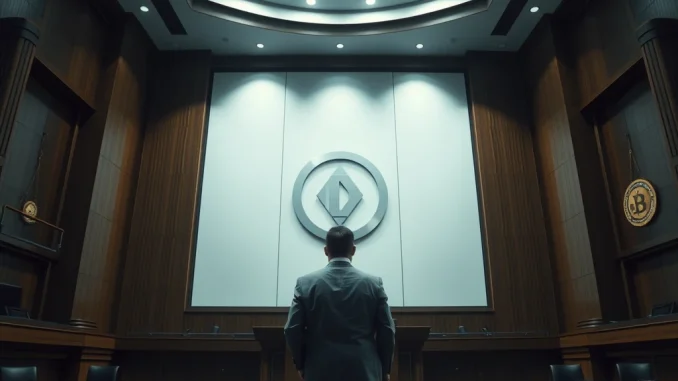
The legal battle surrounding former Celsius CEO Alex Mashinsky is heating up. In a significant development, attorneys representing Mashinsky have formally challenged the U.S. prosecutors’ recommendation of a hefty 20-year prison sentence. This move underscores the intense stakes involved in the upcoming sentencing hearing for the executive of the now-bankrupt crypto lending platform, Celsius.
Why the 20-Year Celsius Sentencing Request?
Prosecutors had sought the two-decade prison term following Mashinsky’s guilty plea earlier this year. While Alex Mashinsky admitted guilt to specific charges – one count of commodities fraud and one count of market manipulation related to Celsius’s native token, CEL – his defense argues the government’s sentencing request is excessively punitive and doesn’t align with the specifics of his plea or his personal history.
The prosecution’s stance likely stems from the scale of the Celsius collapse and the significant financial losses incurred by countless users. The failure of Celsius was a major event during the crypto market downturn, impacting hundreds of thousands of customers globally. The government’s recommended Celsius sentencing reflects a desire to impose a severe penalty for actions perceived to have contributed to this widespread harm and to deter future misconduct in the crypto space.
Mashinsky Sentence: The Defense’s Counter-Argument
Mashinsky’s legal team is pushing back hard against the 20-year recommendation. They have formally requested a significantly lighter Mashinsky sentence, asking the court for a term of no more than 365 days (one year). This dramatic difference highlights the vast gap between the prosecution’s view of the case’s severity and the defense’s perspective.
The core arguments presented by Mashinsky’s attorneys include:
- Non-Violent, First-Time Offender: They emphasize that Mashinsky is a non-violent individual with no prior criminal record, arguing that a lengthy prison term is disproportionate for someone fitting this description.
- Guilty Plea Context: The defense contends that Mashinsky’s guilty plea to the two counts should not be misconstrued as an admission to all the government’s broader, what they term “unsubstantiated claims” regarding his character, intent, or the full scope of the platform’s issues. They argue the plea was specific to the charges admitted.
- Alleged “Demonization”: Mashinsky’s lawyers accuse the prosecution of attempting to unfairly “demonize” their client, potentially influencing the court’s perception beyond the scope of the admitted charges.
This challenge sets the stage for a contentious sentencing hearing where both sides will present their arguments regarding the appropriate punishment for the former Celsius CEO.
What Happens Next in the Crypto Sentencing?
The fate of Alex Mashinsky now rests with the judge who will preside over the sentencing hearing. This crucial stage in the legal process is scheduled for May 8. The judge will consider the arguments from both the prosecution and the defense, the details of the guilty plea, sentencing guidelines, and potentially victim impact statements before determining the final crypto sentencing.
The outcome of this hearing is highly anticipated within the cryptocurrency community and the broader financial world. It could set a precedent for how executives involved in major crypto platform failures are treated by the U.S. legal system.
Summary
Former Celsius CEO Alex Mashinsky is actively contesting the U.S. government’s request for a 20-year prison sentence following his guilty plea to commodities fraud and market manipulation. His defense is seeking a maximum sentence of one year, arguing against the prosecution’s perceived attempt to portray him negatively and highlighting his status as a non-violent, first-time offender. The court will deliver the final Mashinsky sentence on May 8, a decision that will be closely watched as it impacts a prominent figure in the crypto space and potentially influences future legal approaches to digital asset platforms.



